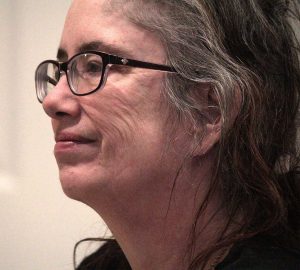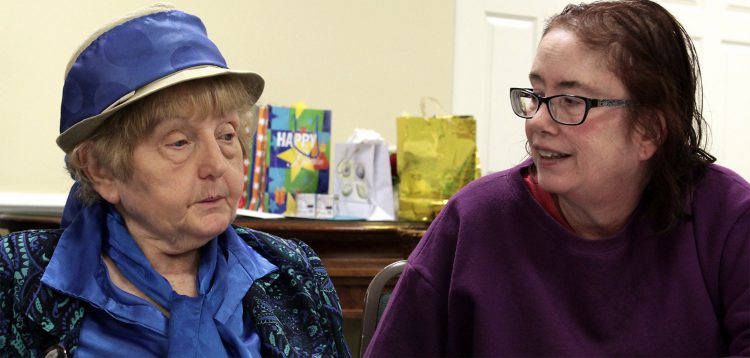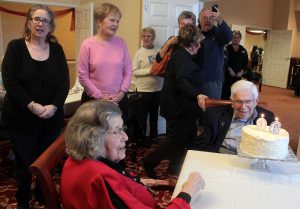Tanna Srulovitch’s cousin Debbie Benjaminov Gurman and Debbie’s son Loren Gurman (represented by Debbie’s husband Don Breiter) eulogized Tanna Srulovitch during Tanna’s funeral on Monday, Oct. 2, at Highland Lawn Cemetery.
We present those eulogies here.
Debbie Benjaminov Gurman: ‘Tanna was unique among us’

While cleaning out my parents’ house, I found a treasure trove of precious family films from our childhood. The films showed our family at happy occasions, laughing, holding hands, dancing in circles, blowing out birthday candles.
From the three Benjaminov teenagers who had escaped Bulgaria by ship to Palestine and who came of age as Israel was founded, there were now seven children, emotionally close but too often geographically distant.
These films documented the increasingly infrequent meetings in Israel and in the USA.
Tanna also had cousins on her father’s side, while I had cousins on my mother’s side as well.
Sadly, most of this extended family is now gone. Three of seven first cousins on the Benjaminov side remain, with two of them raising their families in Israel, my cousins, Adi and Ofer.
Tanna was unique among us, with different life experiences, her childhood travels with her parents to Thailand, Pakistan, and Egypt, 16 years working in Israel as an adult, and different passions.
These included cars, jewelry, the color purple, her volunteer and charitable work (especially with the CANDLES museum) and her beloved dogs.
She was a kind person.
Although she never experienced marriage and motherhood, she had good friends who helped to sustain her in difficult times.
And she could be very happy in her own way.
Above all, she was a survivor, dealing with all the challenges of life which befell her.
We wish her peace.
Debbie Benjaminov Gurman

Loren Gurman: ‘Everyone can master a grief but he that has it’
Tanna was a force of presence, of care and of wit in our family.
She shared of herself too with the Jewish community of Terre Haute and with the many people she met through her travels and residencies spanning across the world.
She lived in Massachusetts, Illinois, in Indiana, in Israel, in Egypt, in Pakistan and in Thailand. She also traveled to see much of the world beyond the communities she belonged to.
Tanna understood many cultures. And still Tanna was able to maintain a unique, creative culture all her own, wherever she went. When sharing a meal or taking a trip, or running an errand, her humor was subtle. And then just as often, her humor was not so subtle.

Funny quips, or the creation of nicknames for already peculiarly named things. Like Google. With a Tanna-ism she would make something funny even funnier.
This humor she shared with friends, family and her beloved [dog] Mini.
For discussing matters with Tanna which were more serious — I should say that to understand another’s grief or another’s illness, their beginnings or their current circumstance — demands a great deal of compassion. And Tanna was a compassionate person.
Tanna was compassionate toward our family, as well as toward the countless [individuals] she knew personally, those she worked with and all those that fill memories of her travels near and far.
And with all lives, there are of course each individual’s challenges. To think that you can ever truly understand the challenges of another, as the other experiences their own challenges within the confines and context of their own individual experience, is too great an assumption.
The famous words come to mind:
Everyone can master a grief
but he that has it.
And so, too, Tanna had grief of her own.
In the ’80s, Tanna had to commune with grief still so young, after suddenly losing her brother. Bobby was only [29] years old. The loss of a sibling, and while still at a very young age — this is I imagine one of the most difficult sorts of grief to bear.
Also untimely was the loss of Tanna’s mother, Miriam. And of course later her father, Joseph.
Only several years ago, Tanna discovered, in her 50s, that she had been adopted.
Only several years ago, Tanna discovered, in her 50s, that she had been adopted.
At the time of Tanna’s childhood, adoption was still thought of as a more complex, and frankly more stigmatized, matter than society knows it to be today. And so, Joseph and Miriam at the time saw it best that adoption not be mentioned.
Tanna boldly ventured to discover the truth about the beginning of her life. She was even able to meet several members of her biological family in or from Harrisburg, Pa., her birthplace.
Not all of us would brave a journey as potentially harrowing, and perhaps fewer still would do so in the middle of one’s 50s.
After her trips to find documents and meet biological relatives, the inner-workings of her own personal revelations or thoughts spiritually and intellectually I can only fathom to guess. We did not talk at great length about her more personal findings or feelings beyond who she met, and where, and how.
But I imagine that her exploration of her biological roots ironically made her even more profoundly aware of how rooted she is in the tree of our family. Tanna was always and will always be a beloved member of our family.
 I know that she spoke more to some of her cousins in her last years than she had previously. And, I believe at times she found more meaningful interactions with them than ever before.
I know that she spoke more to some of her cousins in her last years than she had previously. And, I believe at times she found more meaningful interactions with them than ever before.
Yet, turning an eye back toward her interactions with the world at large, Tanna’s efforts, Tanna’s working with the board of CANDLES Holocaust Museum, Tanna’s working with the elderly with T’s Helping Hands, and through all of Tanna’s travels — Tanna’s choices and presence will continue reverberating, like all of our deeds, through the hall that is time.
And one of the meaningful choices of hers I will always remember was that she chose to play a significant and caring role for her cousins, aunts and uncles — when they were joyous, but also when they needed help. In happiness and in health, or in loss and in sorrow, Tanna was there for us.
Rabbi Isaac Luria believed that we are all in this plane of existence to learn or to do or to change or to realize, and that when our work in this lifetime is done, we pass on from this life to the next.
The extended family that includes all of humanity, present, past and future, knows some undefinable peace when one individual has understood it for herself in this life.
May Tanna’s work be appreciated by all of us and may our happy memories of her give us joy always.
And lastly, may our memories of Tanna give us strength as we choose to further our own realizations and our own choices — our own work here — in this plane of existence, in this lifetime.
Loren Israel Gurman
